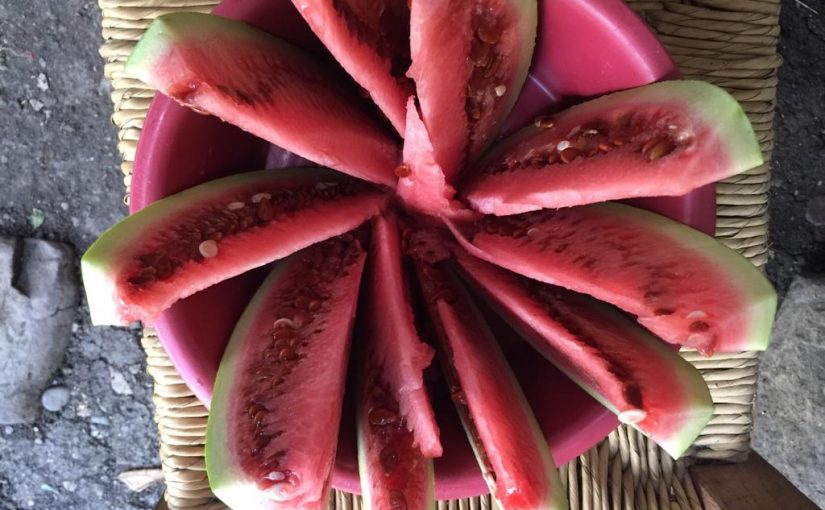In this lesson we learn the past tense of verbs. In Nahuatl, verbs are divided into four classes. We have already made references to Class Three verbs, which end in /ia/ or /oa/. Transitive and intransitive verbs exist in all four classes.
Clase 2
Class 2 verbs take the suffix “-qui” for the singular and “-queh” for the plural. The final vowel is deleted.
ni – (verbal base) – qui
ti – (verbal base) – qui
ø – (verbal base) – qui
ti – (verbal base) – queh
in – (verbal base) – queh
ø – (verbal base) – queh
Some Class 2 verbs change drastically, especially those ending in /hu/ and /cu/ and those whose last consonant is /y/, /qu/, /c/, or /m/.
Tlamanēxtilli tlen ahāhuiltiliztli tlen tlachīhualiztli (Example of the conjugation of verbs)
Niquīzqui “I went out”
Quīzqui “She/he went out”
Tiquīzqueh “We went out”
Inquīzqueh “You (plural) went out”
Quīzqueh “They went out”
/tōca/ “to plant corn”
Nictōcqui “I planted cord”
Tictōcqui “You planted corn”
Quitōcqui “She/he planted corn”
Tictōcqueh “We planted corn”
Inquitōcqueh “You (plural) planted corn”
Quitōcqueh “They planted corn”
/hueli/ “to be able”
Nihuelqui “I was able”
Tihuelqui “You were able”
Huelqui “She/he was able”
Tihuelqueh “We were able”
Inquihuelqueh “You (plural) were able”
Huelqueh “They were able”
The verbs in class 2 that change drastically are the following:
1.Verbs with the last syllables /hu/ and /cu/
hu → uh
Niccōhua “I buy” (something)
cu → uc
Nicahcocui “I preserve, put away” (something)
Nicahcoucqui “I preserved, put away” (something)
Tlamanēxtilli tlen ahāhuiltiliztli tlen tlachīhualiztli (Example of the conjugation of verbs)
Ticcōuhqui “You bought” (something)
Quicōuhqui “She/he bought” (something)
Ticcōuhqueh “We bought” (something)
Inquicōuhqueh “You (plural) bought” (something)
Quicōuhqueh “They bought” (something)
Nicahcoucqui “I preserved, put away” (something)
Ticahcoucqui “You preserved, put away” (something)
Quiahcoucqui “She/he preserved, put away” (something)
Ticahcoucqueh “We preserved, put away” (something)
Inquiahcoucqueh “You (plural) preserved, put away” (something)
Quiahcoucqueh “They preserved, put away” (something)
2. Verbs with the last consonants /y/, /qu/, /c/, y /m/.
y → x
Nicpiya “I have” (something)
qu → c
c → z
m → n
Ninehnemi “I walk”
Tlamanēxtilli tlen ahāhuiltiliztli tlen tlachīhualiztli (Example of the conjugation of verbs)
Ticpixqui “You had” (something)
Quipixqui “She/he had” (something)
Ticpixqueh “We had” (something)
Inquipixqueh “You (plural) had” (something)
Quipixqueh “They had” (something)
Tictecqui “You cut” (something)
Quitecqui “She/he cut” (something)
Tictecqueh “We cut” (something)
Inquitecqueh “You (plural) cut” (something)
Quitecqueh “They cut” (something)
Titizqui “You ground corn”
Tizqui “She/he ground corn”
Tiquizqueh “We ground corn”
Intizqueh “You (plural) ground corn”
Tizqueh “She/he ground corn”
Tinehnenqui “You walked”
Nehnenqui “She/he walked”
Tinehnenqueh “We walked”
Innehnenqueh “You (plural) walked”
Nehnenqueh “They walked”
ahci “to swim”
huetzca “to laugh”
huitōni “to jump”
Conjugate the following verbs in the past tense in all singular and plural persons.
Class 2
Huitōni (to jump)
Tlapāna (to break)

